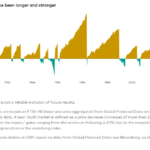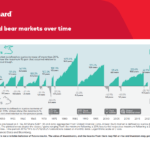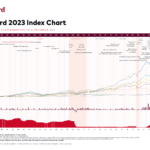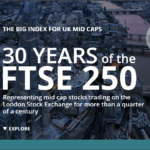In the April monthly note, PIMCO’s Bill Gross states that Britain risks facing a vicious cycle of rising debt costs as investors demand a penalty fee on gilts to protect against inflation. Along with Greece and other Eurozone’s Club Med countries UK is on PIMCO’s “must-avoid” countries.
From a recent article:
“The flood of British debt is likely to “lead to inflationary conditions and a depreciating currency”, lowering the return on bonds. “If that view becomes consensus, then at some point the UK may fail to attain escape velocity from its debt trap,” he wrote in his April monthly note.
Mr Gross said the UK is not yet in crisis but gilts are sitting on a “bed of nitroglycerine” and must be handled delicately. Spreads on 10-year gilts have crept up to 14 basis points above those of Spain, itself in some difficulty.”
A British fund manager noted that the market is at fair value based on forward P/E ratio. According to Morgan Stanley this ratio must be just above 12x earnings for the market. But based on the ‘Schiller PE’ ratio, the UK is valued at 15x times earnings for this year. This would mean a rise of 20% in share prices from current levels. However that is unlikely. According to Ted Scott, director of UK Strategy for F&C; Investments there are far fewer large growth companies in the UK than a decade ago and the current recession is likely to hold back growth for many years.
The public sector net debt as a percentage of GDP stood at 60.3% at the end of February compared to 50.5% at the end of February 2009. The unemployment rate reached 7.8% at the end of January.However public sector employment increased by 7,000 in fourth quarter of 2009 to reach over 6 million. Similar to many states in the U.S., public sector employees are paid lavishly in the UK and are kept on payroll despite lack of work. The unionized public workers are a major burden on British taxpayers.
More than 50% of earnings of the FTSE 100 index companies come from emerging markets. The majority of these companies are in the mining, consumer goods and energy sector. Hence investors still have opportunities in the British market but have to be highly selective. For example, British&Dutch; consumer giant Unilever(UL) has a strong presence in many emerging markets. But banks such as Llyods Bank (LYG) and Royal Bank of Scotland(RBS) are still struggling with losses and can be best avoided. The British government also own major stakes in them after their bailouts during the financial crisis.



